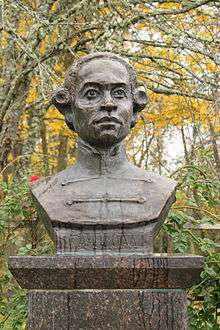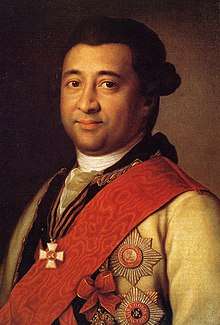Afro-Russians
Afro-Russians are people of Black African descent that have migrated to and settled in Russia. The Metis Foundation estimates that there were about 50,000 Afro-Russians in 2009.[2]
| Total population | |
|---|---|
| 50,000 (2019)[1] | |
| Regions with significant populations | |
| Moscow, St. Petersburg, Rostov-on-Don, Oryol, Lipetsk, Astrakhan | |
| Languages | |
| Russian · Abkhaz · Niger–Congo languages · Nilo-Saharan languages · English · French | |
| Religion | |
| Christianity, Islam |
Terminology
Representatives of African peoples in the Russian language are commonly called negry.[3] The word negr comes from Spanish: negro through other European languages (German: Neger, French: nègre). In the Russian language the word does not carry a negative connotation.[3][4]
Russian Empire

There was never a significant number of people of African descent in Russia, even after Western European colonization of the continent. For centuries Russia was too isolated to interact with Africa. Russia's lack of involvement in the colonization of African or the Atlantic slave trade prevented it from developing significant relationships with African tribes or colonies. Despite this, Abram Petrovich Gannibal, a Russian of African descent, became a general and nobleman in the Russian Empire. After being kidnapped from Logone (in contemporary Cameroon) by Ottoman forces as a boy, he was sold to Russian diplomat Fedor Golovin[5] in 1704 and gifted to Tsar Peter the Great, who freed and adopted him.[5][6] As an adult, he rose to nobility, and served the Russian Empire in both civil and military capacities.[6] He is also a maternal great-grandfather to the famed Russian poet Alexander Pushkin.[5]
Early Soviet Period
After the revolution several black African families came to the Soviet Union under the auspices of the Comintern. They were chiefly specialists in the spheres of industrial production and agriculture. The technical equipment, modest means, and professional experience brought by them were an appreciable contribution to economic development of a new state. Among them were Oliver John Golden and his wife Bertha Bialek (he brought with him a group of 16 Afro-American experts in the cultivation of cotton), well-known African-American poet Langston Hughes with a group of 22 filmmakers, Paul Robeson with his family and many others. Some of them stayed in Russia and their descendants still live there.
Post-War, the Festival Children
When African nations gained independence from colonialism, the Soviet Union offered scholarships to young people from these nations. About 400,000 Africans studied in the former Soviet Union between the late 1950s and 1990.[7] The first significant arrival of Africans was for the 6th World Festival of Youth and Students held in Moscow in 1957.The mixed race African descended children were called festival children because of their appearance, timing of their birth, and lack of a father figure. Many Africans also attended the Peoples' Friendship University of Russia.
Notable Afro-Russian
- Lyukman Adams – half-Nigerian triple jumper[8]
- Aleksandr Alumona – half-Nigerian footballer
- Allan Dugblei – half-Ghanian footballer
- Abram Gannibal – Cameroonian-Russian statesman, military leader, and politician
- Ivan Gannibal – half-Cameroonian military leader. Son of Abram Gannibal[9]
- Alice Edun – half-Nigerian singer
- Nkeirouka Ezekh – half-Nigerian Olympic curler[10]
- Brian Idowu – half-Nigerian Russian Premier League footballer
- Victor Keyru – Sierra Leonian-Russian basketball player
- Yelena Khanga Russian journalist and TV anchor of Zanzibari-American descent[11] Khanga divides her time between New York City and Moscow.[12]
- Stanislav Lebamba – half-Congolese footballer[13]
- Cyrille Makanda – half-Cameroonian basketball player
- Avua-Siav Leo Nelson – half-Ghanian footballer
- Peter Odemwingie – half-Nigerian footballer
- Adessoye Oyewole – half-Nigerian footballer
- James Lloydovich Patterson – Russian child actor, naval officer, and poet of African-American and Ukrainian descent
- Jean Sagbo – Beninese-Russian politician. Elected councilman of the town of Novozavidovo[14][15]
- Jerry-Christian Tchuissé – Cameroonian-Russian footballer
- Emiliya Turey – part-Sierra Leonean handball player
- Grigory Siyatvinda – part-Zambian actor
- Elladj Baldé – half-Guinean figure skater
- Isabel dos Santos – half-Angolan businesswoman
See also
References
- . Inosmi
- Gribanova, Lyubov "Дети-метисы в России: свои среди чужих" Archived 4 November 2008 at the Wayback Machine (in Russian). Nashi Deti Project. Retrieved 25 February 2010.
- "Негры". Brockhaus and Efron Encyclopedic Dictionary: In 86 Volumes (82 Volumes and 4 Additional Volumes). St. Petersburg. 1890–1907.;
Negr Archived 24 May 2012 at the Wayback Machine // Dictionary of the Russian Language (Ozhegov): (first edition 1949, the reference to the edition of 1992 together with Natalia Shvedova). - This article includes content derived from the Great Soviet Encyclopedia, 1969–1978, which is partially in the public domain.
- Grinberg, Miriam (2009). "Pushkin and Gannibal: Ethnic Identity in Imperial Russia". The Gettysburg Historical Journal. 8: 61.
- Catharine Theimer Nepomnyashchy; Nicole Svobodny; Ludmilla A. Trigos (2006). Under the Sky of My Africa: Alexander Pushkin and Blackness. Northwestern University Press. pp. 31, 47–49, 56, 63, 74. ISBN 0810119714.CS1 maint: multiple names: authors list (link)
- Lily Golden & Lily Dixon "TV project «Black Russians»". Africana Project. Retrieved 25 February 2010.
- Timur Ganeev (17 April 2012). "Russia's Olympic team becomes more diverse". Retrieved 16 August 2012.
- "Ганнибал Иван Абрамович – Личности". www.korabel.ru (in Russian). Retrieved 16 June 2020.
- I support Kenyans by the call of my blood
- Eric Foner, "Three Very Rare Generations" (review of Soul to Soul), The New York Times, December 13, 1992.
- Patterson, Vanessa LeAnne, "Khanga, Yelena (1962- )", BlackPast.org.
- Лебамбу ноги кормят
- Narizhnaya, Kristina. "A Russian milestone: 1st black elected to office – World news – Europe – msnbc.com". MSNBC. Archived from the original on 27 July 2010. Retrieved 27 July 2010.
- "Der erste schwarze Stadtrat Russlands – News Ausland: Europa". tagesanzeiger.ch. Retrieved 7 August 2010.
External links
- Funmetis a Foundation for Afro-Russian Children
- (in Russian) Article "Afro-Russians" from Rossiyskaya Gazeta
- (in Russian) Article "Black Man" from Online Vremya
- Василий из «Чернобыля». История реального ликвидатора [ENG SUBS]

